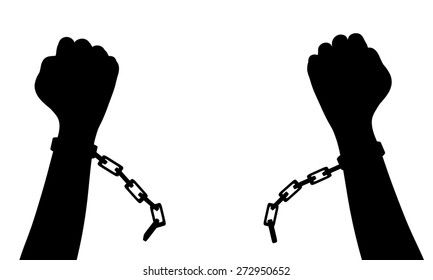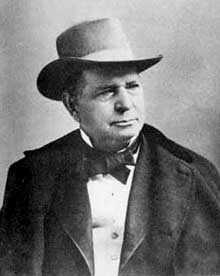 Breaking the Chains: A Life of Slavery
Breaking the Chains: A Life of Slavery
With the arrival of French refugee planters and their slaves in Louisiana, and others fleeing the slave revolts in Haiti, southern slaveholders demanded laws to be enshrined in the new territory making slavery legal, so that they could settle there and ensure that nothing similar to what had just taken place in Haiti (then known as Sainto Domingue) could occur. The French and Spanish had brought the concept of slavery to the United States in the early eighteenth century, taking captured African prisoners to the New World as slaves, and while an Act of Congress passed in 1808 banned the importation of slaves, northern slaveholders managed to sell their slaves locally to the slavemasters in the deep South, entrenching slavery in the southern states to the point where it could only be dislodged by all-out civil war, as happened in 1861.
It would be pointless, time-intensive and probably not actually that relevant for me to discourse on the entire history of slavery here, even were I to confine that treatise to the United States, but one point should perhaps be made, which often is either lost or ignored, and that is that up until the Civil War, slavery was in fact legal in ALL thirteen states of what was then known as “The Colonies”. These included the likes of Maine, Massachussets, Rhode island and Connecticut, all of whom would fight on the side of the Union against (ostensibly) slavery in the coming war. Presidents of the United States, Supreme Court Justices and other high-ranking political figures all kept slaves. While the practice was certainly more overt and rife in the southern states (what became known as The Deep South) it wasn’t as if there was some invisible demarcation line which, once crossed, meant you were free. Certainly, the northern half of the country moved towards abolition quicker and with more agreement than did the southern states, which depended on slave labour for the cotton industry, but there was no, if you’ll excuse the bad pun, black and white about the issue. Some northerners believed passionately in the idea of slave ownership, even saw it as their right, and presumably some were just too used to it to envisage changing.

It’s hard to understand what it meant to be a slave in those times. Obviously, you didn’t get paid, and were worked like, well, a slave, but that wasn’t the worst of it. Your owner could use any excuse to beat you, imprison you, even sell you on if you “didn’t work out”, and if you were female, forget it: rape, beatings and misery would be your lot. And there would be nothing you could do about it. If you were owned in a slave state - one of the states where slavery was legal, which as I mentioned before the Civil War was all of them - your owner was not breaking any laws by punishing or even killing you. Yeah. You were property, and if you didn’t perform then the owner had the right to destroy you. If you talked back, you could be whipped or even hanged, or if the slavemaster just happened to be having a bad day (or, more likely, was sadistically inclined) you could be beaten to within an inch of your life, and nobody would or could raise a finger to help you. Anyone who tried either ran the risk of getting the same treatment if they were a slave too, or if not, could be fined or imprisoned for having interfered with the lawful work of a slaver. Anyone who helped slaves escape would also be subject to prosecution, and if you became known as, excuse the phrase, a ni
gger-lover in a slave state, your life wouldn’t be worth tuppence.
Little wonder, really then, that the South fought so hard to prevent the abolition of slavery. Economically, they stood to lose the most, and they also saw it as tradition, their way of life being taken from them. Worse, should slaves gain right as free men, they might even be able to legally fight back against the men who had been their owners. Fear of retribution for decades of repression and cruelty surely stood large in the minds of the southerners, as did fear of loss of earnings. If they had to pay men and women to do the work that they had heretofore performed free of charge, they could go broke very easily. Businesses in the South (and in the North, too, to some lesser degree) had made their money on the backs of forced unpaid labour; they were not about to let go of the whip just yet.
As for the North, I feel that while there were undoubtedly many who saw slavery as an abomination, more, especially those in government, regarded its abolition as more an expedient than a moral crusade. With countries from Britain to France and Spain outlawing the practice, the embryonic nation surely did not want to be seen as the “savage cousin”, the unprincipled and uncivilised new country that clung to old, outmoded and in most lands by now illegal ways, that refused to give up its hold on the past and stride boldly and with confidence into the shining new future. America wanted to be part of that future, and it’s hard to maintain relations with other, forward-looking states if they have already abolished slavery and you have not. Hard to make your voice heard over the sound of dragging chains and the cries of human misery.
To say nothing of all the extra votes that would be up for grabs when the blacks and other slaves were made free men. Who was it likely these newly emancipated men would cast their future with? The man who had freed them, or his opponent? There were certainly ulterior motives a-plenty behind the freeing of the slaves, and it would be naive in the extreme to believe that Lincoln passed the Emancipation Act simply out of the goodness of his heart. You can be sure, had he not the weight of popular opinion on his side, had other nations not abolished slavery by then, he would not have gone ahead simply because it was the right thing to do. Presidents and leaders seldom swim against the tide, because if they do they often end up drowning, at least in the polls. For something of this monumental nature to happen it has to be the will of the people, or at least, a majority of them.









 Hybrid Mode
Hybrid Mode